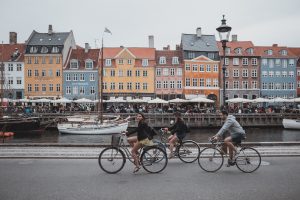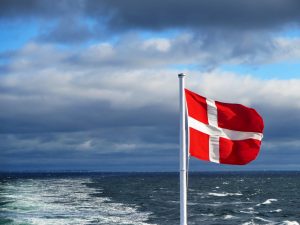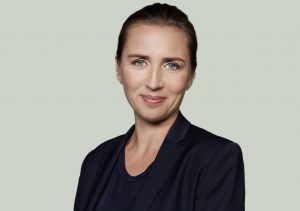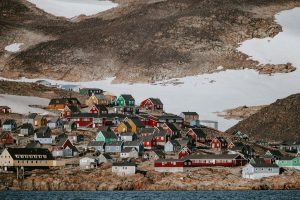Denmark has been led by Social Democrats since 2019. In 2020, the Danish government has been able to pay their citizens a corona aid of 1570$ each and priorized homless people during the vaccination process. Prime Minister Frederiksen and her party enjoy great popularity among the Danes. What is their key to success?
The Danish approach towards progressive Social Policies
 When talking about Denmark, one is obliged to discuss the term ´welfare state´, as this is one of the fundamental pillars of Danish state action. In practice, this includes all public services which lead to social coherence or aim to protect society. Those include education, a functioning health system, social welfare and infrastructure development.
When talking about Denmark, one is obliged to discuss the term ´welfare state´, as this is one of the fundamental pillars of Danish state action. In practice, this includes all public services which lead to social coherence or aim to protect society. Those include education, a functioning health system, social welfare and infrastructure development.
The recent prioritization of homeless people in the Danish vaccination process represents a prime example for such services. Denmark has been vaccinating since the end of December 2020, following a 12-step-plan which divides the population into groups categorized according to their age and health status. The country’s goal is to immunize the whole population by the early summer months of 202

Danish inhabitants suffering financial difficulties can apply for social aid called Kontanthjælp. If a person experiences a drastic change in social conditions such as job loss, divorce or severe illness and is no longer able to provide for themselves or their family, they receive governmental payment. Meanwhile they are also offered help with searching for jobs or further education to secure their wellbeing afterwards.
In June 2020 Minister of Finance, Nicolai Wammen, of the Social Democrats announced a financial relief package designed to mitigate the negative effects of coronavirus on the economy. Over 9 billion dollars was reallocated from a holiday allowance, which was originally intended to be paid out as an additional pension in retirement, in order to cover the cost of the policy. Split equally over the 5,8 million strong Danish population each citizen will receive about 1,570 dollars. The aid payment should stimulate consumption and create new jobs as the economy is suffering from the Corona lockdown.
Leading through the pandemic
The Covid-crisis has turned into a pitfall which few governments have been able to avoid. It marks one of the most difficult times to be a political leader. Global economy is on the downside, unemployment is on the rise and people are suffering from increasing pandemic fatigue.
Nonetheless the ruling social democratic party of Prime Minister Mette Frederiksen has experienced increased voter approval among the population. When Frederiksen took office after the Danish general election in 2019, her party held 26% of votes, rising up to 32% (dated of April 2021).
 During her office term, Frederiksens cabinet revitalized the tradition of tripartite negotiations which used to play an important role in danish politics but had previously been suspended. Tripartite agreements are held between the government, workers unions and employers and aim to navigate interests so socially just decisions can be made, especially during such challenging times. Recent agreements included those on short time working schemes, the reintroduction of the wage compensation scheme and an agreement on the extension of the temporary distribution of work scheme.
During her office term, Frederiksens cabinet revitalized the tradition of tripartite negotiations which used to play an important role in danish politics but had previously been suspended. Tripartite agreements are held between the government, workers unions and employers and aim to navigate interests so socially just decisions can be made, especially during such challenging times. Recent agreements included those on short time working schemes, the reintroduction of the wage compensation scheme and an agreement on the extension of the temporary distribution of work scheme.
In April 2021, Denmark introduced a coronapas system designed to enable non-essential businesses to reopen to the public. Currently hairdressers, beauty facilities and driving schools are included in that pass and it is only available to people who recently suffered from COVID, are fully vaccinated or tested negative for the virus. Cinemas, restaurants, museums and Cafés are due to be reopened at the end of April.
Denmark under Mette Frederiksen
Until recently the Danish social democrats were most commonly known for their controversial turn on immigration politics. This is presumed to have played a key role in their win of the 2019 general election where they gained a total of 25,9% of votes.
Statsminister Mette Frederiksen deltager lige nu i uformelt rådsmøde i EU på video med de øvrige regeringsledere. På dagsordenen er bl.a. vaccineudrulning i Europa. #dkpol #euco pic.twitter.com/W8KlSYsMCR
— Statsministeriet (@Statsmin) January 21, 2021
The previous right-wing government which ruled Denmark until 2019 introduced measures such as a “jewellery law” and a “ghetto plan”. The former allowing police to search the belongings of asylum seekers and have them turn in their valuables when applying for asylum.
Few weeks after the election, Mette Frederiksen and her Socialdemokraterne made a slight change in their migration politics. They passed a law allowing refugees to stay in Denmark even if they lost their permit of residence to stay in Denmark, provided that they already worked for at least 24 months and still have that same job. Still, in March 2021 Denmark marked the first country in the EU which planned to send refugees back to Syria, claiming that Damaskus was now safe. Due to current impossible negotiations with Bashar al-Assad those are paused for the moment.
Aside from migration , Denmark has announced some important steps regarding environmental protection. The country set a legally binding climate goal, stating their intent to reduce emissions by 7.2 million tonnes until 2030.
The Danish Folketing
 Currently there are 14 Parties present in Danish parliament called Folketing, the leading party being the Social Democrats. As the parliament also includes Greenland and the Faroe Islands, four seats are reserved for them.
Currently there are 14 Parties present in Danish parliament called Folketing, the leading party being the Social Democrats. As the parliament also includes Greenland and the Faroe Islands, four seats are reserved for them.
Overview of all 14 parties present in the Danish Parliament (dated April 2021):
- The Danish Social Democrats (Socialdemokraterne)
- The Liberal Party (Venstre)
- The Danish People’s Party (Dansk Folkeparti)
- The Social Liberal Party (Radikale Venstre)
- The Socialist People’s Party (Socialistisk Folkeparti)
- The Red-Green Alliance (Enhedslisten)
- The Conservative Party (Det Konservative Folkeparti)
- The Alternative (Alternativet)
- The New Right (Nye Borgerlige)
- Liberal Alliance
- Inuit Ataqatigiit, Greenland
- Siumut, Greenland
- Sambandsflokkurin, The Faroe Islands
- Javnaðarflokkurin, The Faroe Islands
Despite the comparably high number of parties in the parliament, all Prime Ministers holding office since 1972 were either members of the liberal Venstre party, the conservative Konservative party or the social democratic Socialdemokraterne.
In Denmark, the leading party holds office over the Prime Minister post as Denmark is designed as a parliamentary democracy. The Social Democrats (or any other party since 1909) did not get enough of the 179 needed votes to rule on their own, therefore they are backed by the Social Liberals Venstre, the Red Green Alliance and the Socialists Peoples party.
What about the Queen?
The current Queen Margrethe II. has been in office since 1972. A year later, Denmark joined the European Community, a predecessor of the European Union founded in 1952. The Kingdom of Denmark was converted into a constitutional monarchy in 1849 by King Frederik VII. This limited the power of the monarch, meaning that there is still a Queen, but Parliament passes the laws.
Nowadays each and every Dane has to abide by the Danish constitution, including the monarchs. Yet, the Queen officially remains head of the Danish government. Denmark maintains Danish Crowns as a currency for the moment, so once the pandemic is over, don´t forget to get some change before you visit.
